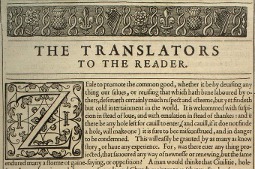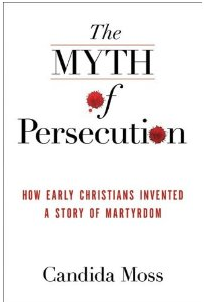Church History/Christian History
"the best informed people on earth as to the events of the last twenty-four hours"
Body
Why Study Church History? Getting Beyond American-Evangelical Amnesia
(11 benefits of studying church history)
Discussion
Book Review - Reformation Resources for Children
As a parent of six young children, I am constantly looking out for Christian resources to put in their hands. The Reformation in particular, is one of the pivotal moments in church history that has been sadly neglected today. More and more authors however, are now filling this gap and providing excellent books for our children.
Discussion
"...a consciousness of history is not part of the package"
Body
The history deficit in evangelical (and fundamentalist) churches, and six ways to fix it.
Teaching Historical Sense to a Sophisticated and Discerning Lady (Aged 7)
Discussion
Were First Century Christians That Much Better?

One of the most interesting words in the English language is hagiography. One of its definitions is the one I have in mind, an “idealizing or idolizing biography.” The idea is that once someone has died, we remember the individual as being better than he or she actually was. This adjusting of memory and idealization of those who lived before us is common throughout the human race.
But people “back then” were really not as wonderful as we think they were.
This is universally done with the folks who made up the very early church. Although the very early church had its strong points (the Apostles were around to teach and lead, God worked some unprecedented miracles like raising the dead, etc.), the people who made up the early church community were far from wonderful.
The case of Corinth
Consider the words of the New Testament itself about the believers who made up the family of faith. In Corinth, we notice a man sleeping with his stepmother (1 Cor. 5:1) while fellow Christians in the church accepted this brother as someone in good standing. The Corinthian church was divided into factions, each following the unique perspectives of a famous Christian leader (1 Cor. 3:4-5).
Things were so bad at Corinth that during their carry-in dinners members were consuming all the food before all arrived; some even became drunk while they waited (1 Cor. 11:21). The Corinthian Christians invented the “happy hour.”
Discussion
The Preface, Part 5: Is it Really an Embarrassment to the KJVO Movement?
 Republished with permission from Theologically Driven. (See also: previous installments in this series.)
Republished with permission from Theologically Driven. (See also: previous installments in this series.)
The Federalist Papers are a series of 85 essays supporting the ratification of the United States Constitution, written by Alexander Hamilton, James Madison, and John Jay. Madison himself is commonly known as the Father of the Constitution. Federal judges, when interpreting the Constitution, frequently appeal to the Federalist Papers as a contemporary account of the intentions of the authors.
In a recent Wall Street Journal article, Peter Berkowitz observes:
Most astonishing and most revealing is the neglect of The Federalist by graduate schools and law schools. The political science departments at Harvard, Yale, Princeton, Stanford and Berkeley—which set the tone for higher education throughout the nation and train many of the next generation’s professors—do not require candidates for the Ph.D. to study The Federalist.
I think there may be a parallel with the Preface to the King James Version, The Translators to the Reader. If one wishes to understand the KJV, the purposes and intents of the translators themselves, the Preface is the authoritative source. And what it reveals is the exact opposite of the claims made for the KJV by those in the KJV-only movement. The KJV-only position argues that only the KJV is the perfect Word of God without any error. It is no wonder, then, that KJV-only advocates purposely avoid the Preface since it is an embarrassment to their false claims.
Discussion
The Preface, Part 4: Marginal Notes in the King James Version
 Republished with permission from Theologically Driven. (See also: previous installments in this series.)
Republished with permission from Theologically Driven. (See also: previous installments in this series.)
The King James-only view argues that only the 1611 KJV is the Word of God in English. All other versions or translations are so corrupt that they are not to be used, nor be appealed to as the Word of God. Most KJV-only advocates contend that the printed Greek text from which the KJV was translated, commonly called the Textus Receptus (TR), is inspired and inerrant, and the KJV is the only translation that accurately translates the TR. But this is not true. The New King James Version (NKJV) is also translated from the TR. Being TR based, the NKJV cannot so easily be discounted by KJV-only proponents. Therefore, they seek to find other ways to disqualify the NKJV.
A common complaint against the NKJV by KJV-only advocates is the use of notes provided by the translators. For example, D. A. Waite says:
The diabolical nature of the New King James Version shows itself in their printing all the various readings of the Greek text in the footnotes. They print all sides and take their stand in favor of none of them. By so doing, they confuse the readers. The editors have made no decision as to what God’s Words really are (Defending the King James Bible, p. 125).
William P. Grady sounds a similar warning:
Discussion
The Preface and the KJV's Exclusivity and Authority
 Republished with permission from Theologically Driven.
Republished with permission from Theologically Driven.
Is Only the King James Version the Word of God?
The King James-only movement refuses to recognize any other translation in English as the Word of God. As I noted in previous posts here and here, the Preface to the 1611 KJV is an embarrassment to the KJV-only position because in the Preface the translators themselves absolutely reject the erroneous idea that any translation has such a unique position. Unlike modern KJV-only advocates, the translators themselves admired the work of previous translators of the English Bible.
And to the same effect say we, that we are so far off from condemning any of their labours that travailed before us in this kind, either in this land, or beyond sea, either in King Henry’s time, or King Edward’s, (if there were any translation, or correction of a translation, in his time) or Queen Elizabeth’s of ever renowned memory, that we acknowledge them to have been raised up of God for the building and furnishing of his Church, and that they deserve to be had of us and of posterity in everlasting remembrance.


Discussion